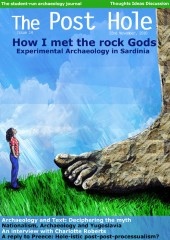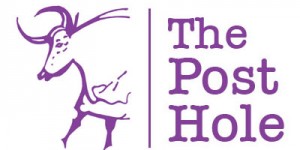
Professor Charlotte Roberts, of the University of Durham, is one of the country's foremost bioarchaeologists and palaeopathologist. Most recently she has published Human remains in archaeology: a handbook, which is perhaps one of the best written books on the subject of human remains. Professor Roberts gave The Post Hole a chance to ask her a few questions about her career and gave us her advice on breaking into the world of bioarchaeology.
DF- You started your career training as a nurse, what made you change careers in this way and was it a difficult career move?
CR- I wanted to do an interesting degree to prove to myself I could do it, so I chose Archaeology, and then intended to return to nursing. No, it wasn't a difficult career move because I clearly saw how my nursing background could be used in archaeology i.e. studying human remains. The reason I did not return to nursing is circumstance - I got the opportunity to do a masters degree, and then got offered a job as a research assistant on a project focusing on human remains and the rest is history. My nursing background prepared me well for interpretation of evidence of disease and its impact on our ancestors.
DF- As a self-confessed 'bioarchaeologist', you have literally written 'the book' on the study of disease, how important do you feel this is to the study of the past?
CR- It's a good base from which to work, tries to get people thinking about utilising multiple forms of data to understand health in the past (not just human remains), and emphasises the importance of contextualisation of data. It's not the final work though!
DF- Has having a background in another discipline helped with your research as a bioarchaeologist and palaeopathologist?
CR- Yes, because I have a medical background and I can understand how different diseases affect people in real life. It has also helped me realise that the same disease does not affect everybody in the same way (even down to bone level); everybody is unique and will deal with diseases differently, and disease will manifest itself in people in a variety of ways
DF- In what way do you feel palaeopathology has progressed over the past few decades and do you believe a move forward in this way is beneficial to the research area?
CR- Standards for recording have developed since the publication of the 1994 (US) and 2004 (British) standards for data recording — this means comparisons of data between sites can be more reliably made. The development of ancient pathogen DNA analysis to diagnose disease is another development that has allowed us to learn more about the origin and history of disease than was possible before. However, it is a destructive process and we cannot guarantee that pathogen DNA will survive burial. There are also issues about whether methods used are robust enough to hold up to scrutiny. Histological and radiographic analyses have also advanced our knowledge.
DF- If there was any direction you would like to see the discipline of archaeology advance in over the next few years what would it be?
CR- In my field, more hypothesis and question driven population studies within context. I would also like us as a discipline to stop calling the skeletons we analyse interesting 'cases' and 'specimens' and treat them as once living people, as they are, and I feel we should make our work more relevant to the here and how, and the future, rather than do studies 'for their own sake'. In archaeology as a whole in the UK, I would like more publication of grey literature, and archaeologists not being the only people who make decisions about whether skeletons should be reburied.
DF- What is the most exciting project that you have worked on so far?
CR- Probably the pathogen ancient DNA analysis project I am doing now with Manchester University, looking at DNA of tuberculosis in skeletons from a wide variety of sites in Britain and the rest of Europe. We are looking ultimately at strain change in the bacteria that causes tuberculosis through time; this I think will inform the present and future of this devastating infection today.
DF- There are many BSc students in our department and I'm sure many others who are planning on entering your field, do you have any advice for them?
CR- It's a competitive market out there. There are many masters' courses in this field in the UK and therefore many graduates, and then many PhD graduates. The job market is limited, funded PhD places scarce and academic jobs very rare. If you accept that and still want to pursue this area for your career then it is very rewarding but be prepared for a long road to eventual success. I was lucky because when I entered this field there were no masters courses and few people doing PhDs in the subject and I was lucky to be around at the right time to get a job.
With thanks to Professor Roberts.




